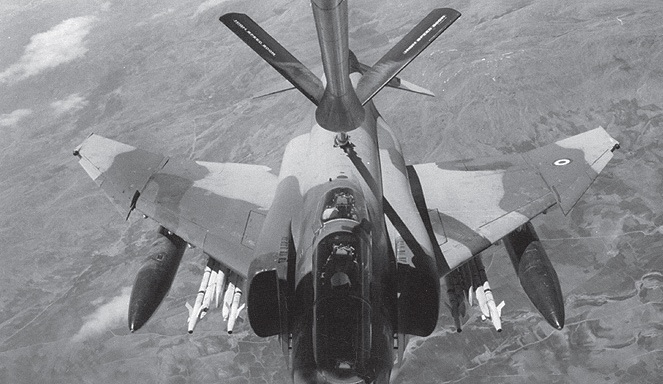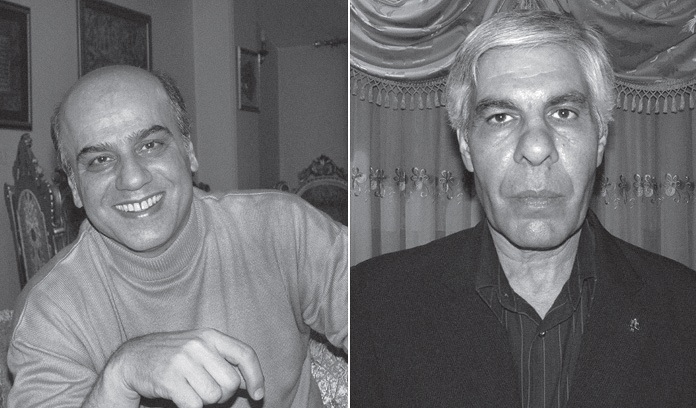Air Raid to Al-Waleed (23)
The Story of Demolishing Fighters and the Equipment in Al-Waleed Triple Military Bases Known as H-3
2016-6-12
Air Raid to Al-Waleed (H-3)
The Story of Demolishing Fighters and the Equipment in Al-Waleed Triple Military Bases Known as H-3
By: Brigadier General Ahmad Mehrnia
Tehran, Sooreh Mehr Publications Company
2010 (Persian Version)
Translated by: Zahra Hosseinian
It doesn’t take much time when ten Phantom bombers come. Two previous flights to the south of Lake Uremia, familiarity with the specified points of the home country, and most importantly expertise of participant pilots, especially leader and sub-leader, cause that pilots find tankers in radio silence finally. So far the fuel of external tanks on the wings of bomber has run out, and each aircraft in a short time stick to the tanker and its tanks fill up without talking to boom operator. Usually, refueling is done over twenty-two thousand feet altitude, because whatever the height is lower, the effects of turbulence are more and the likelihood of vigorous shaking increases. For this reason, various events may occur; the boom being separated or collided to the fuselage and damage it, is the worst of them especially in such a mission which is supposed ten aircrafts refuel. Think what will happen if such an incident occurs in the first or second refueling. So, refueling at this altitude is one of the important points of this mission. Trained and skilled pilots of tankers accompany Phantoms near the border after one stage of refueling over the lake, and in this rout, deliver fuel to a number, so that they can traverse the long way more comfortable.

Phantom aircraft armed with four air-to-air missiles, and two extra tank of petrol on the wings, in the air cover mission is refueling. The photo has been taken from the cabin of tanker.
About refueling Ahmad Soleimani says:
"As long as the tanker would fly over the Lake, we had no problems; but as soon as we would fly over the land, piloting it in the refueling state was really hard, because the turbulence made swaying. Across the Iraq border, we had the same problem; but thanks to God and the experience and skills of the pilots, we refueled without any incident despite the difficulty."
Shortly after Phantoms say goodbye, two tankers leave the zone. According to retired Capt. Ali Javaheri, one of boomers of tankers, these two aircrafts return to Tehran and land on Mehrabad International Airport.
By the grace of God, bombers all well refuel and no problem happens for them. The one-word code for continuing the operation is communicated by Col. Izadseta to the flight leader from tankers and it is cleared that everything is fine; therefore, two reserve aircrafts must return to the base and the other eight ones continue the mission. Mohammad Atighechee, leader of one of reserves, accompany the team several miles inside the Iraqi border, and in spite of all orders to maintain radio silence, he cannot control himself and finally run the risk and by radio ask the flight leader to allow him to stay with team.

Colonel Mohammad Atighechee and Ibrahim fakhar, pilots of two reserve aircrafts
Amir Baratpour says:
"I would think the reserve aircraft has return, but surprisingly I heard his voice in enemy territory that asked me to allow him to accompany us. I would understand him. He was one of our bold and fearless pilots. He also had participated in the previous flight. He really didn’t like to come back. But we couldn’t take any action unlike the brief, because the amount of risk would increase. Therefore, I made a short, clear and a little sharp command, ‘Come back.’ And he left the group and returned."
In this regard Atighechee says:
"As the last one of my team, I did refueling and immediately went in with the flight team. I entered into Iraq territory behind all and continued several miles to force leader accept my presence. By radio, I announced that I’m also with them and asked him to let me accompany the team, when I saw the situation is fine. Major Baratpour, who was surprised, with a short harsh tone said, ‘Come back!’ and I had no choice but to return to the base. So, completely upset I entrusted my colleagues to God and returned to the base."
Captain fakhar, second reserve, says:
"When the war began, I was still Leader 4[1] and not being allowed to fly for bombing and close supporting in the front cabin. One of the reasons was that we were banned for air refueling. In addition, because of things that had happened, we had few pilots too. Leaders 4 were appointed for piloting in the rear cockpit at the first days of the war, but soon it was learned that when an aircraft would be targeted or meet with accident, two pilots would be lost, that could make problems for base in the future. Therefore, it was decided that to use leaders 3 along with trained officers for rare cabin[2] and leaders 4 only carry out the mission of air cover. At 22nd Mehr 1359, I refueled in an air cover flight without permission. Although it was hard work, but I was able to do this job well with the experience of watching my colleagues during refueling, and on that day I flew four hours with two refueling. Then I met Major Baratpour, operations deputy of base, and asked him to permit me to do my four sorties remained from my checks of leader 3, so I could participate in overseas combat missions along with other friends. Finally he approved and I passed necessary training and was appointed in reserve flight of mentioned operation for the first overseas mission, although I really liked to be in attacking group. But fortunately no problem occurred for colleagues and after refueling over Lake Uremia, I returned to base. Captain Atighechee, who was older than me, progressed to the point where he asked the leader to accompany them, despite the requirement of observing radio silence, but the leader refused. My flight lasted two hours and five minutes but it seemed shorter to me, while I had a very long wait for my friends’ returning.
[1]. Leader is a rank which is acquired by different planed flights during the service. Pilot who newly entered the operational battalion, have no leader rank and is called ‘Non leader’. Acquiring skills and defined flight hours, pilots become, respectively, Leader 4, Leader 3, Leader 2 and Leader 1. Some restrictions may be decreased by promoting to the higher leader rank. Leader 3 can lead four aircrafts, for example, while leader 2 can lead 16 aircrafts I flights.
[2]. Usually, in two cockpit aircrafts, the pilot in the front cockpit bears responsibility of flying and firing and the officer in the rare cockpit responsible for working with radar, navigation and guiding the pilot to find the target and lock on it. These officers are not allowed to be in the front cabin. But pilots, who have trained for rare cabin, can be used in front cabin.
Number of Visits: 4680








The latest
- The Embankment Wounded Shoulders – 9
- Spraying Poison in Prison
- Operation Beit al-Moqaddas and Liberation of Khorramshahr
- The 367 Night of Memory – 2
- Memoirs of Ali-Asghar Khani, Commander of the Karbala Battalion in the Ali ibn Abi Talib Division
- The Embankment Wounded Shoulders – 8
- Unveiling of the book "Qasem" narrated by Morteza Sarhangi
- The Study Journey of Hypocrites
Most visited
- Memoirs of Hujjat al-Islam Reza Motalebi
- The Study Journey of Hypocrites
- Unveiling of the book "Qasem" narrated by Morteza Sarhangi
- The Embankment Wounded Shoulders – 8
- Memoirs of Ali-Asghar Khani, Commander of the Karbala Battalion in the Ali ibn Abi Talib Division
- The 367 Night of Memory – 2
- Operation Beit al-Moqaddas and Liberation of Khorramshahr
- Spraying Poison in Prison
Morteza Tavakoli Narrates Student Activities
I am from Isfahan, born in 1336 (1957). I entered Mashhad University with a bag of fiery feelings and a desire for rights and freedom. Less than three months into the academic year, I was arrested in Azar 1355 (November 1976), or perhaps in 1354 (1975). I was detained for about 35 days. The reason for my arrest was that we gathered like-minded students in the Faculty of Literature on 16th of Azar ...A narration from the event of 17th of Shahrivar
Early on the morning of Friday, 17th of Shahrivar 1357 (September 17, 1978), I found myself in an area I was familiar with, unaware of the gathering that would form there and the intense reaction it would provoke. I had anticipated a march similar to previous days, so I ventured onto the street with a tape recorder I had brought back from my recent trip abroad.A Review of the Book “Brothers of the Castle of the Forgetful”: Memoirs of Taher Asadollahi
"In the morning, a white-haired, thin captain who looked to be twenty-five or six years old came after counting and having breakfast, walked in front of everyone, holding his waist, and said, "From tomorrow on, when you sit down and get up, you will say, 'Death to Khomeini,' otherwise I will bring disaster upon you, so that you will wish for death."Tabas Fog
Ebham-e Tabas: Ramzgoshayi az ja’beh siah-e tahajom nezami Amrika (Tabas Fog: Decoding the Black Box of the U.S. Military Invasion) is the title of a recently published book by Shadab Asgari. After the Islamic Revolution, on November 4, 1979, students seized the US embassy in Tehran and a number of US diplomats were imprisoned. The US army carried out “Tabas Operation” or “Eagle’s Claw” in Iran on April 24, 1980, ostensibly to free these diplomats, but it failed.

